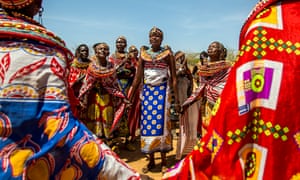 |
| In the company of women: (centre) Judia, 19, came to the village of Umoja six years ago, having run away from home to avoid being sold into marriage. Umoja was founded in 1990 by 15 women who were raped by British soldiers. Photograph: Georgina Goodwin for the Observer. |
Umoja, a village in northern Kenya, is inhabited exclusively by women. The village was founded in 1990. At that time it numbered 15 women; now there are 47 women and 200 children. It serves as a refuge for girls and women fleeing FGM, child marriage, rape, and other gender-based violence; in particular, "most women reported cases of gang rape by soldiers, who attacked the women when they were out gathering firewood or fetching clean water." Although they filed a mass lawsuit against the British soldiers allegedly responsible for many of the attacks, the Royal Military Police concluded that there was no basis for their cases.
The village features a small but thriving economy and a school. Women run a campsite for safari visitors, sell beads and other crafts, and experience economic autonomy within the collective, often for the first time in their lives. Sexual freedom is also accorded to these women; as the author writes, "Curiously, for an all-woman village, there seems to be a lot of children around. How does this happen? 'Ah,' laughs a young woman, 'we still like men. They are not allowed here, but we want babies and women have to have children, even if you are unmarried.'" Perhaps most importantly, women report feeling a sense of safety, security and happiness in Umoja. Women in the community are drawn to the all-female environment where everyone supports each other, and the safe haven after trauma.
The community creates such a feeling of a space apart that, journalist Julie Bindel reports, "many of the women tell me they cannot imagine living with a
man again after they have been living in Umoja. Towards the end of my visit I
meet Mary, 34, who tells me she was sold to a man of 80 for a herd of cows when
she was 16 years old. 'I don’t want to ever leave this supportive community of
women,' she says. Mary shows me a handful of dried beans that she will be
cooking soon for dinner. 'We don’t have much, but in Umoja I have everything I
need.'"
To me, this story connects to ideas of gender essentialism and what it means to be male, female, masculine or feminine. As many of you discussed in your Middlesex papers, that book raises the question of whether there are certain attributes that are typically or exclusively masculine or feminine. Are women actually wired to be more collaborative and to seek peace? Are men by nature violent? Middlesex both raises and challenges those ideas. I'm curious what you think about what the Umoja experiment suggests on this topic.
To me, this story connects to ideas of gender essentialism and what it means to be male, female, masculine or feminine. As many of you discussed in your Middlesex papers, that book raises the question of whether there are certain attributes that are typically or exclusively masculine or feminine. Are women actually wired to be more collaborative and to seek peace? Are men by nature violent? Middlesex both raises and challenges those ideas. I'm curious what you think about what the Umoja experiment suggests on this topic.
What surprises you most about this story?
What lessons can we learn from this village, if any? Should this model be replicated? How would that work?
Could you imagine a comparable village of men? Why or why not? How would it be different?
No comments:
Post a Comment